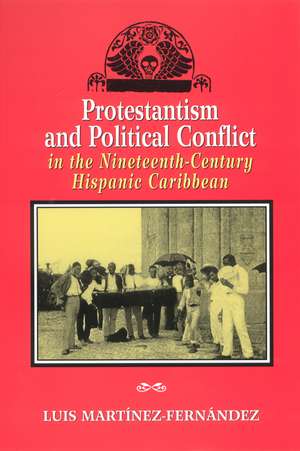Protestantism and Political Conflict in the Ninteenth-Century Hispanic Caribbean
Autor Luis Martínez-Fernándezen Limba Engleză Paperback – noi 2001
Catholicism has long been recognized as one of the major forces shaping the Hispanic Caribbean (Cuba, Puerto Rico, and the Dominican Republic) during the nineteenth century, but the role of Protestantism has not been fully explored. Protestantism and Political Conflict in the Nineteenth-Century Hispanic Caribbean traces the emergence of Protestantism in Cuba and Puerto Rico during a crucial period of national consolidation involving both social and political struggle. Using a comparative framework, Martínez-Fernández looks at the ways in which Protestantism, though officially “illegal” for most of the century, established itself, competed with Catholicism, and took differing paths in Cuba and Puerto Rico.
One of the book’s main goals is to trace the links between religion and politics, particularly with regard to early Protestant activities. Protestants encountered a complex social, economic, and political landscape both in Cuba and in Puerto Rico and soon found that their very presence, coupled with their demands for freedom of worship and burial rights, involved them in a series of interrelated struggles in which the Catholic Church was embroiled along with the other main forces of the period—the peasantry, the agrarian bourgeoisie, the mercantile bourgeoisie, and the colonial state. While the established Catholic Church increasingly identified with the conservative, pro-slavery, and colonialist causes, newly arrived Protestants tended to be nationalistic and to pursue particular economic activities—such as cigar exportation in Cuba and the sugar industry in Puerto Rico. The author argues that the early Protestant communities reflected the socio-cultural milieus from which they emerged and were profoundly shaped by the economic activities of their congregants. This influence, in turn, shaped not only the congregations’ composition, but also their political and social orientations.
One of the book’s main goals is to trace the links between religion and politics, particularly with regard to early Protestant activities. Protestants encountered a complex social, economic, and political landscape both in Cuba and in Puerto Rico and soon found that their very presence, coupled with their demands for freedom of worship and burial rights, involved them in a series of interrelated struggles in which the Catholic Church was embroiled along with the other main forces of the period—the peasantry, the agrarian bourgeoisie, the mercantile bourgeoisie, and the colonial state. While the established Catholic Church increasingly identified with the conservative, pro-slavery, and colonialist causes, newly arrived Protestants tended to be nationalistic and to pursue particular economic activities—such as cigar exportation in Cuba and the sugar industry in Puerto Rico. The author argues that the early Protestant communities reflected the socio-cultural milieus from which they emerged and were profoundly shaped by the economic activities of their congregants. This influence, in turn, shaped not only the congregations’ composition, but also their political and social orientations.
Preț: 230.84 lei
Nou
Puncte Express: 346
Preț estimativ în valută:
44.18€ • 45.77$ • 36.87£
44.18€ • 45.77$ • 36.87£
Carte indisponibilă temporar
Doresc să fiu notificat când acest titlu va fi disponibil:
Se trimite...
Preluare comenzi: 021 569.72.76
Specificații
ISBN-13: 9780813529943
ISBN-10: 0813529948
Pagini: 264
Dimensiuni: 152 x 229 x 15 mm
Greutate: 0.43 kg
Ediția:None
Editura: Rutgers University Press
Colecția Rutgers University Press
ISBN-10: 0813529948
Pagini: 264
Dimensiuni: 152 x 229 x 15 mm
Greutate: 0.43 kg
Ediția:None
Editura: Rutgers University Press
Colecția Rutgers University Press
Notă biografică
Luis Martínez-Fernández is chair of the department of Puerto Rican and Hispanic Caribbean Studies at Rutgers University, where he also holds a joint appointment in the department of history.
Cuprins
List of Illustrations
Preface
Introduction
Part I. The Era of Catholic Exclusivism, 1815-1868
1. Religion and Political Struggle
2. The Roman Catholic Grip
3. Crypto-Protestants and Pseudo-Catholics
Part II. The Revolutionary Cycle, 1868-1898
4. War and Religion
5. Puerto Rico's First Protestant Congregations, 1869-1998
6. Cuba's First Protestant Congregations, 1871-1883
7. Revolution, Exile, and Cuban Protestantism, 1868-1898
Epilogue
Notes
Bibliography
Index
Preface
Introduction
Part I. The Era of Catholic Exclusivism, 1815-1868
1. Religion and Political Struggle
2. The Roman Catholic Grip
3. Crypto-Protestants and Pseudo-Catholics
Part II. The Revolutionary Cycle, 1868-1898
4. War and Religion
5. Puerto Rico's First Protestant Congregations, 1869-1998
6. Cuba's First Protestant Congregations, 1871-1883
7. Revolution, Exile, and Cuban Protestantism, 1868-1898
Epilogue
Notes
Bibliography
Index
Descriere
Catholicism has long been recognized as one of the major forces shaping the Hispanic Caribbean (Cuba, Puerto Rico, and the Dominican Republic) during the nineteenth century, but the role of Protestantism has not been fully explored. Protestantism and Political Conflict in the Nineteenth-Century Hispanic Caribbean traces the emergence of Protestantism in Cuba and Puerto Rico during a crucial period of national consolidation involving both social and political struggle.
